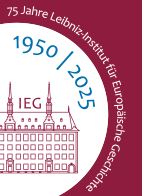Europa und seine Ränder - Schwerpunktthema 2016/17
Angesichts der Flüchtlingsfrage rücken die Ränder Europas zurzeit verstärkt ins Zentrum des öffentlichen Interesses. Gerade an diesen Rändern wird ausgehandelt, was Europa ausmacht. Das Leibniz-Institut für Europäische Geschichte befasst sich mit solchen Aushandlungsprozessen in historischer Perspektive und vertieft dies im Rahmen seines Schwerpunktthemas 2016/2017 mit »Europa und seine Ränder/Europe from the Margins«. Damit setzt das IEG seine Arbeit an einem erweiterten Europa-Begriff fort und fragt nach der Bedeutung vermeintlich randständiger Räume und den mit ihnen verbundenen Prozessen von Inklusion und Exklusion von der Frühen Neuzeit bis in die Zeitgeschichte.
Allzu oft wird Europa als ein Raum verstanden, der sich von einem vermeintlichen Zentrum her ausdehnt. Blickt man hingegen »von den Rändern« her, werden die vieldeutigen und sich wandelnden Grenzräume Europas sichtbar. Eine solche Perspektive ermöglicht es, die ansonsten an die Ränder verwiesenen Anderen bewusst in die Geschichte Europas einzuschreiben und zu verdeutlichen, wie sie Europa durch ihr Denken und Handeln mitkonstituierten. Auf diese Weise wird der politisch, sozial, kulturell und religiös differenzierte Kommunikationsraum Europa vielstimmig und seine Grenzmarkierungen dynamisch und ambivalent.
Das Schwerpunktthema behandelt diese Mehrdeutigkeit aus unterschiedlichen Perspektiven und greift in einer Vortragsreihe im Rahmen des IEG-Forschungskolloquiums beispielsweise die Europabetrachtung aus geographischen Außenräumen auf, so konkret die Europawahrnehmung des amerikanischen Judentums oder protestantischer Siedler in der Neuen Welt. Ausgrenzungen im Inneren werden am Beispiel der Sinti und Roma oder des Umgangs mit Armut betrachtet. Andere Beiträge befassen sich mit Rändern aus einem ideengeschichtlichen Blickwinkel, zum Beispiel mit der Bedeutung des »Dritten Roms« für das Europabild der Orthodoxie, der Frauenemanzipation im 19. Jahrhundert oder Perspektiven auf das säkulare Europa von den Rändern des katholischen Südeuropa.
Darüber hinaus richtet das IEG im Rahmen seines Schwerpunktthemas eine Konferenz zum Thema »Geteilte sakrale Orte und multireligiöser Raum« aus, organisiert eine Masterclass für Stipendiatinnen und Stipendiaten zum Thema »Eurozentrismus« und organisiert für die interessierte Öffentlichkeit eine Filmreihe.
Die Schwerpunktreihe 2016/17 wurde von einer Arbeitsgruppe aus den Reihen der wissenschaftlichen Mitarbeiterinnen und Mitarbeiter konzipiert: Gregor Feindt, Denise Klein, Sarah Panter und Manfred Sing.
Das Schwerpunktthema behandelt diese Mehrdeutigkeit aus unterschiedlichen Perspektiven und greift in einer Vortragsreihe im Rahmen des IEG-Forschungskolloquiums beispielsweise die Europabetrachtung aus geographischen Außenräumen auf, so konkret die Europawahrnehmung des amerikanischen Judentums oder protestantischer Siedler in der Neuen Welt. Ausgrenzungen im Inneren werden am Beispiel der Sinti und Roma oder des Umgangs mit Armut betrachtet. Andere Beiträge befassen sich mit Rändern aus einem ideengeschichtlichen Blickwinkel, zum Beispiel mit der Bedeutung des »Dritten Roms« für das Europabild der Orthodoxie, der Frauenemanzipation im 19. Jahrhundert oder Perspektiven auf das säkulare Europa von den Rändern des katholischen Südeuropa.
Darüber hinaus richtet das IEG im Rahmen seines Schwerpunktthemas eine Konferenz zum Thema »Geteilte sakrale Orte und multireligiöser Raum« aus, organisiert eine Masterclass für Stipendiatinnen und Stipendiaten zum Thema »Eurozentrismus« und organisiert für die interessierte Öffentlichkeit eine Filmreihe.
Die Schwerpunktreihe 2016/17 wurde von einer Arbeitsgruppe aus den Reihen der wissenschaftlichen Mitarbeiterinnen und Mitarbeiter konzipiert: Gregor Feindt, Denise Klein, Sarah Panter und Manfred Sing.


